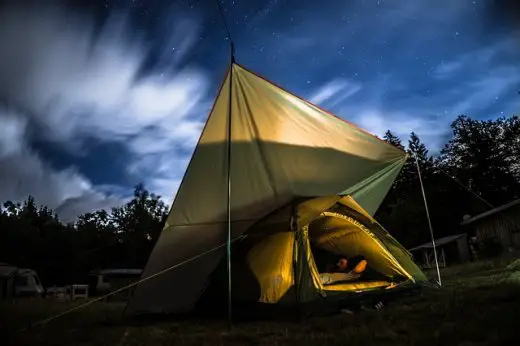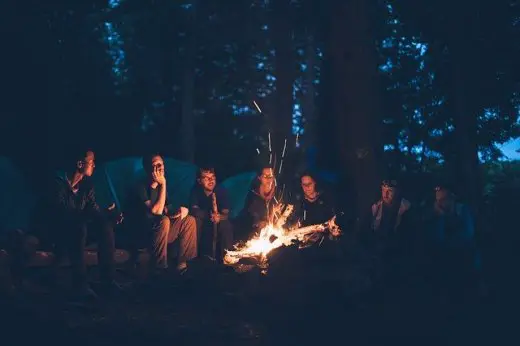
Do you snore in your sleep while camping? Or maybe you camp with a loud snorer and know the frustrations of interrupted sleep?
Perhaps you’ve never camped with a snorer, but you’ve stayed at a campsite where your sleep has been disturbed by a loud snorer who is a complete stranger!
There’s nothing more irritating than escaping to the wilderness for a camping trip with the aim of being lulled to sleep by the sounds of water and wildlife, only to find yourself trapped with a snorer that is so loud you can hear nothing else.
In addition to not being able to hear the sounds of nature, camping with a loud snorer is likely to disrupt your sleep, making your intended break far less enjoyable.
The good news is that you can do something about it, as both the snorer and the snorer’s camping partner. Stopping snoring, or even reducing it, while camping will make your trip much more pleasurable for everyone involved, including other people staying at the campsite.
Ways to Stop Snoring While Camping

If you are an individual looking to stop your snoring (either for your own health or the sanity of your partner), there are a range of things you can implement. Give these approaches a try to see what is most effective for you.
Avoid alcohol before bed
Alcohol makes snoring worse, so do the right thing and reduce your intake.
It might even be worth refraining from alcohol consumption altogether during your camping trip to ensure you and your campmates all get a good night’s sleep and can enjoy your adventure.
If you can’t imagine a camping trip without a cold beer, swap to water, or even tea a few hours before you intend to go to sleep. This is likely to reduce the impact of alcohol.
Sleep on your side
Some people snore more when they sleep on their backs. If this is you, try sleeping on your side instead. This may require you to take an extra pillow or sleeping pad to help support your body and ensure you don’t roll onto your back during the night.
Another trick is to stick a tennis ball to the back of your pajama top (placing a tennis ball in a sock sewed onto the back of your shirt is an effective way to attach it) so that you become uncomfortable when you try to roll onto your back. You can use some of these methods at home to train your body to sleep on its side, as once it becomes a habit, these measures won’t be necessary.
Elevate your head
Sometimes adding an extra pillow can elevate your head enough to reduce or stop snoring. Raising the head can assist with breathing by helping the jaw and tongue to come forward, allowing the air to flow through more freely.
This article is owned by Recapture Nature and was first published on December 11, 2019
Clear nose before sleep
If blocked sinuses or nasal passages are causing your snoring, make sure to give them a good clear out before bed. This might involve using saline to rinse your sinuses, taking a decongestant, or using a humidifier. Determine what method works best for you and make sure to go prepared.
Try anti-snoring devices
There are a range of anti-snoring appliances on the market, and it might be worth giving some a try if you are finding it hard to get your snoring under control. This might be in the form of nose strips or a mouthpiece, whatever is best suited to you as an individual.
Why do People Snore?

Snoring is a condition that occurs when air cannot move easily through your throat and nose as you sleep. It’s very common, and most people snore occasionally, although more extreme snoring that occurs over the long-term can indicate a deeper problem, and medical professionals should be consulted. Sometimes people who snore more often simply have nasal tissue that vibrates more easily, thus creating sound more easily.
While mild snoring is a normal thing, it can still be disruptive to an individual’s sleep and that of their partner. Interrupted sleep can lead to a range of problems, including moodiness and irritability, fatigue during the day, and other health issues.
Seeking professional advice is a great way to identify the reason why you are snoring, which will then allow you to put measures in place to stop it.
This article is owned by Recapture Nature and was first published on December 11, 2019
Common Causes of Snoring

There are a number of reasons why snoring occurs, although to narrow down the cause of your snoring, we recommend consulting a medical professional.
Weight
People who are unfit or overweight tend to be more prone to snoring. A lack of muscle tone or fatty tissue around the neck area can result in snoring. If you believe this to be the case, it might be worth losing a few kilograms.
Age
As we get older, our throat narrows, and we lose muscle tone around our neck and throat. This results in an increased likelihood of snoring. We can’t do anything about aging, but healthy lifestyle choices can help manage it.
Nasal problems
Snoring occurs from blocked air passages, so people with nasal or sinus problems are likely to be snorers. These types of issues make it difficult to inhale, resulting in snoring, and should be treated to reduce the occurrence of snoring.
Alcohol and medications
Substances can increase snoring and should be avoided in order to get a peaceful night’s rest. Alcohol and smoking are well known to increase the frequency and intensity of snoring, while medications such as Valium and Ativan (that are designed to relax the body) can relax the throat muscles so much that snoring occurs.
Snoring Etiquette for Campers

While it will be in your best interest (and the interests of your traveling companions) to stop your snoring, there are a few extra steps you should take when camping to ensure you are not disrupting others.
Let your camping companions know
Snoring is a common problem and nothing to be ashamed about, although that doesn’t mean it isn’t irritating for both the individual and those around them.
Be upfront with your camping companions and let them know if you are a loud snorer. It is better to be honest and let them know ahead of time, rather than deal with a tired and disgruntled campmate after they unexpectedly had no sleep.
That way, you can all work together to put strategies in place to ensure everyone gets a good night’s sleep. Also, providing this information allows your friends to make informed choices about sleeping arrangements.
Light sleepers may decide not to share a tent with you or even to set up camp some distance away from your site to ensure they can get some rest.
Choose a campsite far from others
If you are a loud snorer and find it difficult to get it under control, it might be best to set up camp away from other people.
A loud snorer can disrupt an entire campsite (meaning you will be dealing with more than solely your irritated friends), so sleeping a bit further away can be an effective way to keep the peace.
Choose a campsite near white noise
When selecting your place for slumber, consider going near a river or somewhere else where there is white noise. That way, your snoring will hopefully be drowned out (even if only partially) and won’t impact the sleep of others.
Go to sleep after everyone else
If none of the above solutions work for you, it may mean you have to sacrifice your own beauty sleep and go to bed after everyone else. Many people can sleep through snoring if they manage to get to sleep first, so it would be the right thing to do to allow this to occur.
Bring earplugs
Given that you are the one causing the interruption, it’s only fair that you come prepared. Go stocked with multiple pairs of earplugs that you can give your camping companions if they are having difficulty sleeping.
This article is owned by Recapture Nature and was first published on December 11, 2019
They are likely to drown out some of the sounds. Even if it doesn’t block it out completely, it is a nice gesture that will ensure people have more patience with your snoring.

